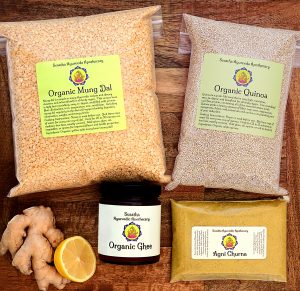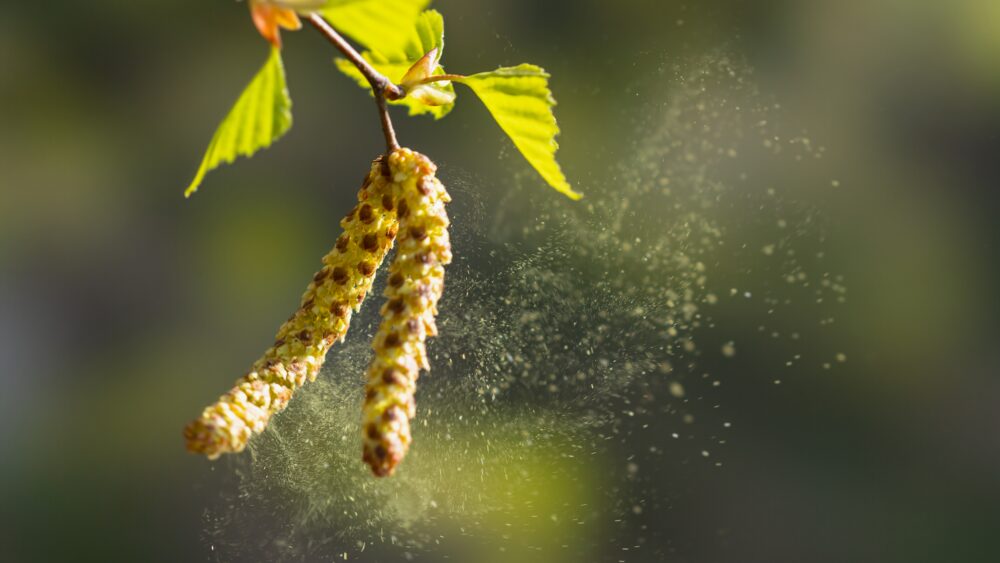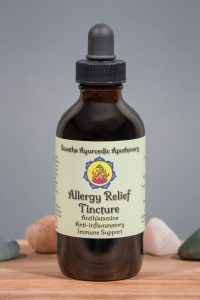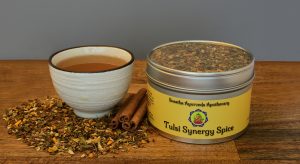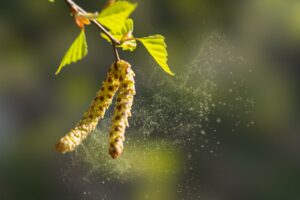 Have you ever noticed that certain years you experience more severe seasonal allergies than others? I have and unfortunately, these past few months have been one of the more dramatic allergy seasons for me. So what causes seasonal allergies, why are some years worse than others, and most importantly, what can we do to (naturally) get relief?
Have you ever noticed that certain years you experience more severe seasonal allergies than others? I have and unfortunately, these past few months have been one of the more dramatic allergy seasons for me. So what causes seasonal allergies, why are some years worse than others, and most importantly, what can we do to (naturally) get relief?
What are seasonal allergies?
Allergies are known as asatmya, or intolerance, in Ayurveda. Seasonal allergies are caused by an environmental irritant that a person’s body is not able to adjust to. The body sees this intolerable foreign substance as an intruder and creates an exaggerated immune response by releasing chemicals such as histamines, leukotrienes, and prostaglandins. These chemicals lead to a variety of symptoms such as sneezing, coughing, congestion, itchiness, wheezing, shortness of breath, cloudiness, and fatigue (to name a few). The most common culprits for environmental allergies include tree pollen, grass, mold, ragweed, and dust mites.
Why are some allergy seasons worse than others?
According to Ayurveda, there are several factors that will lead to a more severe reaction to environmental allergens. The main factors perhaps are the strength of your Agni (digestive fire) and the level of Ama (toxins) in your system. A weak or sluggish digestive fire plus a high amount of toxins cannot process and eliminate allergens efficiently. These issues can also create low-grade inflammation throughout the system, making your immune system more reactive to allergens. Therefore, strengthening digestion and flushing toxins is often the first step in preventing (or treating) seasonal allergies.
Other major factors that will increase your sensitivity to allergens include high stress, low Ojas (immunity), poor sleep, overworking, and general depletion. Doshic imbalance can also play a strong role in your susceptibility as well. For example, if your Kapha is already high as the spring season begins, you will be more prone to allergy-related congestion, cough, and runny nose. If your Pitta is already high, you will be extra susceptible to inflammation, burning, itchiness, rash, and hives. When Vata is elevated during allergy season, you will be more quick to experience allergy-based dry eyes, dry sinuses, wheezing, sneezing, and breathing issues.
Of course, being exposed to an allergen more frequently or excessively will make you more susceptible to allergic reactions as well. This may be due to an increase of the allergen in your environment (say tree pollen is abundant one year). It could be you are exposed to the allergen more often (maybe you’re spending more time outside). This may be a harder causative factor to avoid, but it is even more reason to balance and strengthen your system before the allergies take over; I do not know about you, but I do not want to be locked indoors with the windows shut every time allergy season comes around!
When possible, prevention is best!
In Ayurveda, prevention is always best! And since seasonal allergies often come around the same time each year (with some variance of course), preparing your system BEFORE allergy season begins is much easier and more effective than treating them after they are full-blown and out of control.
With this in mind, I suggest applying some of these recommendations before your allergy symptoms manifest, or at least when they are in their preliminary, milder stages. For this you can perform a kitchari cleanse 2 to 3 weeks prior to your typical onset of allergies, or simply lighten your diet and begin some of the herbal recommendations at this time. Overall, it is most important to keep your digestion, immunity, and Ojas strong and toxins low at the onset of your allergy season. Of course, if you missed out on prevention, these remedies can be used to relieve allergy symptoms at any stage of the game!
Natural Remedies for Seasonal Allergy Relief
Full disclosure: All Amazon links are through an affiliated program, but are thought-out and honest recommendations.
These suggestions are not just something I have read online, they are tried and true remedies that have helped my sensitive body through many encounters with seasonal and environmental allergies alike. They may not be quite as powerful as taking Claritin or Zyrtec daily, but they bring me enough relief that I can function throughout my day without debilitating or obnoxious allergy symptoms. They also are side-effect free except for the positive side-effects such as cleansing your system, reducing inflammation, and reducing your stress levels:)
Herbal Remedies
1. Mahasudarshana Churna
This traditional Ayurvedic formula is a bitter tonic for reducing inflammation, stimulating detoxification, and supporting immunity. With a handful of antiallergenic herbs, it is no surprise that this formula works more efficiently than any other herbal remedy I have tried.
DIRECTIONS
Take ½ to 1 teaspoon of Mahasudarshana in a cup of warm water—upon awakening and again before bed. If a boost is needed during the day, take every 3 to 5 hours during flare-ups.
*Due to its high potency, I generally only recommend taking this formula when allergies are at their worst. To avoid taking this formula too much, I like to rotate it with the Allergy Relief Tincture mentioned below.
Purchase our handcrafted Mahasudarshana Churna here.
2. Allergy Relief Tincture (add Nettle powder for an additional boost!)
Our Allergy Relief Tincture is a safe and gentle herbal extract to remedy occasional allergy flare-ups and daily ongoing allergies alike. This formula is a powerful blend of antiallergenic, anti-inflammatory, and immune-boosting herbs such as Neem, Kalmegha, Guduchi, Turmeric, Kutki, Tulsi, and fresh Cilantro. It can be used on its own for mild to moderate allergy symptoms, or mixed with Nettle powder when they are more severe.
DIRECTIONS
Take 3 to 5 droppers (one dropper equals one squeeze) of Allergy Relief Tincture in a cup of warm water upon awakening and again as needed throughout the day. During stronger flare-ups add ½ teaspoon of Nettle powder.
Purchase our Allergy Relief Tincture here.
3. Cilantro Juice
Cilantro is well known in Ayurveda for its cooling, soothing, anti-inflammatory properties. It contains natural antihistamines and is one of my favorite herbs for combating allergies of all kinds. Although it is best for Pitta dosha, Cilantro is considered tridoshic and can be used by any body type, for occasional or ongoing use.
DIRECTIONS
Make a quart of Cilantro Juice and drink 1 cup daily directly before and during allergy season. During times of more severe allergies, you can increase to 2 to 3 cups daily.
Get our super easy (no juicer needed) Cilantro Juice Recipe here!
4. Ginger and Turmeric (with local raw honey)
Ginger and Turmeric are an amazing duo when it comes to allergy relief. And if you’re like me, they are always at hand in my “kitchen pharmacy” making them very accessible. These spices are well known in Ayurveda for reducing inflammation, clearing congestion, stimulating digestion, and supporting detoxification—all important factors for treating allergies. Adding in some local raw honey is a great way to improve taste while strengthening your system to your local pollen.
DIRECTIONS
Take ¼ teaspoon of Ginger and Turmeric powder with ½ to 1 teaspoon of local raw honey, three times daily before meals. This can be taken in a small cup of warm water (similar to a tea) or taken as a paste and then rinsed down with warm water.
Alternatively (or in addition), drink our Tulsi Synergy Spice Tea or our DIY Tulsi, Turmeric, & Ginger Tea, and add turmeric and ginger (powder or fresh) to your meals and smoothies.
5. Soothing Sinus Nasya
Nasya (nasal oil) is a great way to alleviate allergy-related sinus issues including dryness, inflammation, and congestion. Applying nasal oil to the sinuses also creates a barrier to incoming airborne allergens. Our Soothing Sinus formula is filled with a handful of anti-inflammatory, antimicrobial, and antiallergenic herbs such as Neem, Turmeric, Kalmegha, Pippali, and Ginger.
DIRECTIONS
Each morning, directly before and during allergy season, apply 1 to 5 drops of Soothing Sinus Nasya to each nostril. After applying, lay with your head tilted back for 1 to 3 minutes to allow the oil to fully penetrate into the sinus cavity. Reapply before bed, if needed.
Purchase our Soothing Sinus Nasya here.
6. Herbal Teas for Allergies
Herbal teas tend to be milder in potency, but they often taste better and are more pleasant to take. With a little added (local raw) honey, even kids will often enjoy them! Despite their relative mildness, herbal teas can be a very beneficial complement to the other recommendations mentioned. Teas with Tulsi, Turmeric, Ginger, Coriander, Cilantro, Nettles, Peppermint, Chrysanthemum, or Hibiscus are all good options!
DIRECTIONS
Drink at least one cup of a suitable herbal tea each day before and during allergy season. During flare-ups or more severe conditions, I suggest using this remedy along with at least one of the recommendations above.
My Allergy-Relieving Herbal Tea Favorites:
- COOL DOWN Tea: best for late spring and summer seasons or for Pitta types any time; useful with inflammation, itchiness, skin allergy issues, and excessive heat
- Detox Tea: best for times of high Ama (toxins) and weak Agni (digestion); suitable any time of year and for any dosha type
- Tulsi Synergy Spice Tea: best during fall, winter, and early spring or for Vata and Kapha types any time; useful with congestion, sinus issues, weak immunity, and weak digestion
Dietary Remedies
1. Follow a Kapha-Reducing Diet
Many allergies reveal themselves as congestion, runny nose, sinus issues, fatigue, and a cloudy mind—all of which are Kapha-based symptoms. Eating heavy, congestive foods such as dairy, sweets, starchy foods, and refined grains will increase heaviness and congestion and make these Kapha-type allergy symptoms worse. Alternatively, eating healthy, light, and cleansing foods will help reduce heaviness and congestion and bring you allergy relief.
DIRECTIONS
If your allergy symptoms are similar to the Kapha-allergy symptoms listed above, limit or avoid dairy, refined grains, starchy foods, thick, creamy foods (such as nut butter), sweets (especially with refined sugar), unhealthy fats, and excessively oily foods. Favor a diet filled with light, easy-to-digest foods such as steamed veggies, whole grains, whole foods, fish (especially salmon!), chicken, legumes (ideally not from a can), Quinoa Kitchari, non-creamy soups, and broths.
Check out our Kapha Diet Chart here.
2. Avoid Inflammatory Foods
Since allergies trigger an inflammatory response, it is important to avoid foods that also promote inflammation. Eating an anti-inflammatory diet while favoring foods and spices that soothe inflammation is sure to help reduce your allergy symptoms.
DIRECTIONS
During times of seasonal allergies, avoid foods that aggravate inflammation. This includes processed foods, refined sugar, fructose, corn syrup, refined grains, trans fat, foods high in saturated fat (red meat, cheese, etc), and foods high in sodium. Alcohol and tobacco are major inflammatory substances to avoid as well.
Favor foods that help reduce inflammation such as olive oil, nuts, seeds, fresh fruits and veggies, foods high in antioxidants, whole grains, high fiber foods, and salmon. Adding anti-inflammatory spices to your meals is a great way to make any meal anti-inflammatory! Some great options include Turmeric, Ginger, Cilantro, Coriander, Fennel, Cumin, and Black Pepper.
Try our Agni Churna for an anti-inflammatory boost to your meals!
3. Avoid Foods You Are Sensitive To
It is probably no surprise that eating foods that create a negative reaction in your system will not be helpful when treating allergies. Eating foods that you are sensitive to (no matter how healthy they may be otherwise) will lead to Ama (toxins), impaired digestion, congestion, and inflammation—all of which harbor allergies.
DIRECTIONS
Eat foods that leave you feeling light, energized, and balanced. Do not eat foods that create congestion, acidity, indigestion, elimination issues, itchiness, burning, or any other unwelcome reaction. Despite the information you read online, always listen to your body over anything else!
4. Perform a Kitchari Cleanse
With low digestion and high toxins being a major factor in your susceptibility to environmental allergies, performing a spring or fall kitchari cleanse can be a very effective practice for preventing (or treating) seasonal allergies. Ideally, this should be done just before your allergies manifest, but if they sneak in before you realize it, you can perform a kitchari cleanse after your symptoms come on.
DIRECTIONS
If suitable, perform a kitchari cleanse for 3, 5, or 7 days at the beginning of your allergy season. For this, eat a mono-diet of kitchari, drink cleansing teas (such as CCF, Detox Tea, or Tulsi Synergy Spice), and take cleansing formulas (such as Triphala Churna, Daily Detox Formula, or Mahasudarshana Churna). If high Kapha and congestion are issues, I recommend avoiding Basmati rice and replacing it with quinoa or another suitable whole grain for your kitchari recipe.
Read more on how to perform a kitchari cleanse here.
Try our 7-day Quinoa Kitchari Cleanse Kit!
5. Important Nutrients for Allergy Prevention
To prevent allergies, or at least minimize their effects, it is important to keep your system strong and resilient. There are a handful of nutrients that support a healthy, strong immune system. The most notable would be Vitamin D, Vitamin C, B12, Omega 3, Iron, and Zinc. It is always best to get your nutrients from a food source, but when you fall short despite eating a healthy and varied diet, you may need supplementation.
DIRECTIONS
As you approach allergy season, eat a healthy and varied diet with foods rich in Vitamin D, Vitamin C, Omega 3, Iron, and Zinc. Adequate sun exposure is essential for Vitamin D levels as well. Try to get 5 to 10 minutes of mid-day sun exposure on at least half of your body.
If you suspect a deficiency in any of these areas, talk to your doctor to request blood testing. If your suspicions hold true, you may need to supplement, especially before and during allergy season. I personally use the following supplements (at half dose) with very happy results:
Lifestyle Remedies
1. Rest More
To strengthen your system and build resilience to allergies, it is essential to rest. The more overworked, under-slept, and over-stressed you are the worse your allergy season is going to be.
DIRECTIONS
Although this is really a year-round recommendation, before and during allergy season, avoid overdoing it. Avoid excessive work, exercise, travel, and social activities. Instead focus on slowing down, relaxing, and doing (gentle) activities that you enjoy. Equally as important is to ensure at least 7 hours of sleep each night, ideally from about 10 pm to 5 am.
2. De-Stress
Life is stressful. Stress weakens your system, creates inflammation, and provokes allergies. Therefore, it is extremely necessary to make time for some YOU-time and de-stress every day. My favorite de-stressors are ginger baths, sauna, oil massage, peaceful walks, bike rides, hiking, peaceful music (I LOVE this handpan master!!), gentle Yoga, meditation, Qigong, and Tai Chi—but do not listen to me! Do what you love and what relaxes you!
DIRECTIONS
Make time for 2 to 3 relaxation “therapies” in your day. For example, this could be going on a bike ride before work, going to the sauna after work, and meditating before bed. It is best to get several mini-sessions in throughout the day rather than doing a longer session at once, but do what you can do (and don’t stress about it!)
3. Find Your Zen Through Energy Arts
This is not everyone’s cup of tea, but if you enjoy Yoga, meditation, or any “energy art” (Qigong, Tai Chi, etc), simply performing them regularly is a way to prevent and relieve allergies as they calm your system and reduce inflammatory responses. On many occasions, I have found instant relief to fairly severe environmental allergies by performing even 10 to 20 minutes of gentle Yoga.
DIRECTIONS
Practice 10 to 20 minutes of your preferred Energy Art (gentle Yoga, meditation, Qigong, etc) each morning to prevent allergies, or as needed during a flare-up.
4. Gentle Exercise
Although intense exercise is not recommended, gentle exercise is an amazing way to reduce stress, strengthen your system, and build resilience to alleviate environmental allergies. Some good options include brisk walks, mild bike rides, light cardio, swimming, and lightweight training.
DIRECTIONS
Before and during allergy season (but really all year is best), make sure to get 30 minutes of suitable exercise at least 5 days a week. For this, you should break a light sweat and get your heart rate up while still being able to breathe through your nose.
5. Apply Castor Oil Around the Eyes
This recommendation is specific for itchy, red “allergy eyes”. Castor oil is the ultimate remedy for relieving itchy, dry eyes instantaneously. Ayurveda has been using this remedy for thousands of years and it still holds true today. By nature, castor oil is cooling, soothing, anti-inflammatory, and lubricating making it an itchy, irritated eye essential.
Try our Organic, Cold-Pressed Castor Oil Drops!
DIRECTIONS
Massage 1 to 2 drops of organic, hexane-free, cold-pressed castor oil around the eyelid and eyelashes each night before bed. Some oil will get into the eyes which is recommended for best relief. Castor Oil can be applied to the eyes in the daytime, however, it is very thick and oily so it is generally best to use before bed.
*Discontinue use if any redness or irritation arises. There may be slight blurriness in the first minute or two, but this should go away as the oil sets in.
_________________________________________________________________________________________________________________________
Try our Allergy Relief Tincture!
Try our Tulsi Synergy Spice Tea!
